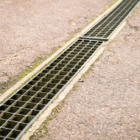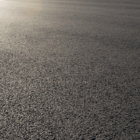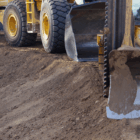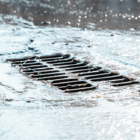Myrtle Beach businesses deal with heavy rain, humid conditions and nonstop vehicle traffic. Without the right drainage plan, water collects on paved surfaces, seeps into the base and weakens the structure. Over time, that leads to cracks, potholes and expensive repairs. Smart commercial drainage solutions Myrtle Beach property owners rely on are the first line of defense against erosion and damage.
How Curbing, Trench Drains and Grading Work Together
Drainage systems aren’t just one feature. They’re a combination of tools designed to keep water moving away from the surface. When curbing, trench drains and grading are built together, pavement lasts longer and businesses avoid costly fixes.
Curbing Directs Water Safely
Curbs frame the lot, but their role is bigger than appearance. They guide water into designated drains, stopping it from washing over edges or damaging soil around the pavement. Strong curbing also protects the most fragile part of any lot (the edges) from both erosion and traffic impact.
Trench Drains Capture Runoff
Trench drains are installed where water runoff is heaviest, like driveways and entry points. They capture water before it pools and direct it into underground systems. This keeps the surface dry and stops water from seeping into cracks that could spread into bigger problems.
Sloped Grading Keeps Water Flowing
Grading sets the foundation for every paving project. A slight slope ensures that water runs off naturally instead of pooling in low spots. Even small dips can create long-term damage, so sloped grading is one of the most important steps in pavement protection.
When these three elements work together, water never has the chance to damage the base of the pavement. That means safer surfaces, less erosion and more years of use.
The Cost of Skipping Drainage Planning
Without a strong drainage system, pavement breaks down much faster. Businesses might see puddles after rain, soft areas under heavy vehicles or edges that crumble. Repairs add up quickly, and the surface never performs like it should. Planning drainage before paving ensures a lot or road is built to last, not just look good on day one.
Protect Your Business with Commercial Drainage Solutions
Water is always the biggest threat to pavement. With the right curbing, trench drains and grading, your property stays safe from erosion and costly repairs. Choosing professional commercial drainage solutions Myrtle Beach businesses can trust keeps pavement smooth, strong and attractive year after year.
Call Weaver Construction Services today to protect your property and keep your pavement investment strong.
FAQs
1. How do commercial drainage solutions stop pavement from eroding?
Commercial drainage solutions protect pavement by moving water away before it harms the base or soil. Curbing channels water off edges, trench drains collect runoff from surfaces and grading makes sure the pavement slopes so water flows off naturally. Those systems stop soil from washing out, preserve the base layer and keep cracks from forming.
2. What is the best type of commercial drainage solution for heavy rain in Myrtle Beach?
The best type includes a mix of curbing, trench drains and well-planned grading. Curbing keeps water from spilling over edges. Trench drains handle large amounts of water in heavy runoff areas. Grading makes sure the surface sheds water instead of letting it pool. Combined those methods give Myrtle Beach businesses reliable protection from erosion and pavement damage.
3. How much does it cost to install commercial drainage solutions that protect pavement?
Cost depends on size of the area, type of solution and slope of the land. Installing curbing costs less than trench drains. Trench drains cost more because they need proper trench depth, drainage outlets and durable materials. Grading costs vary based on soil type and how much leveling or slope work the site needs. Investing in good drainage upfront saves more in repairs over time.









